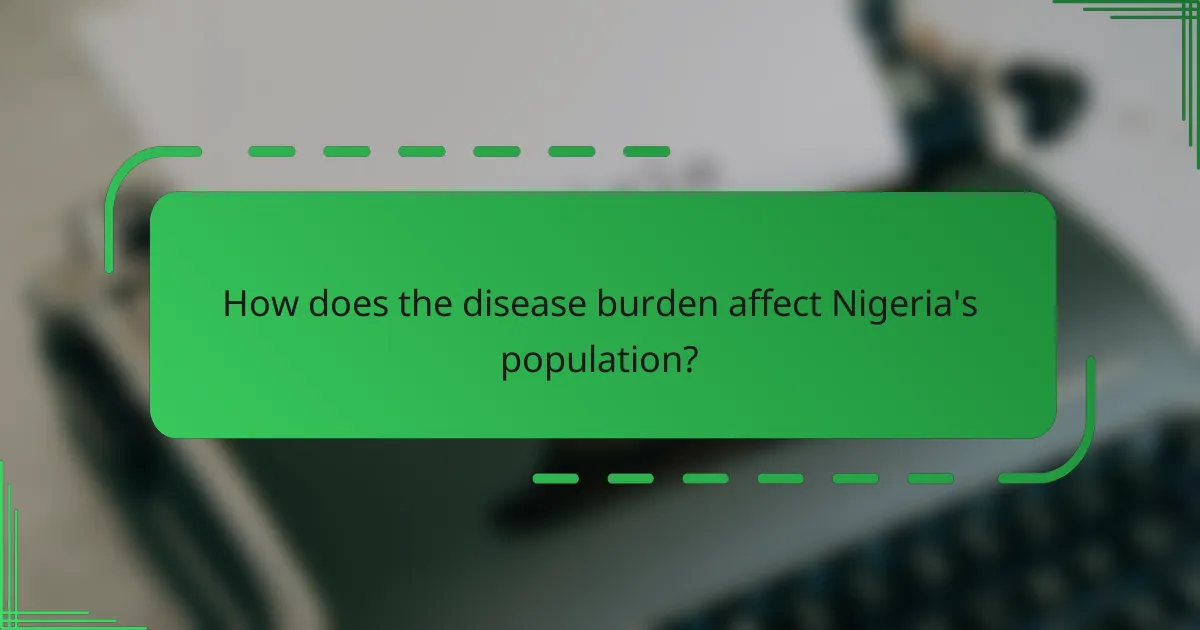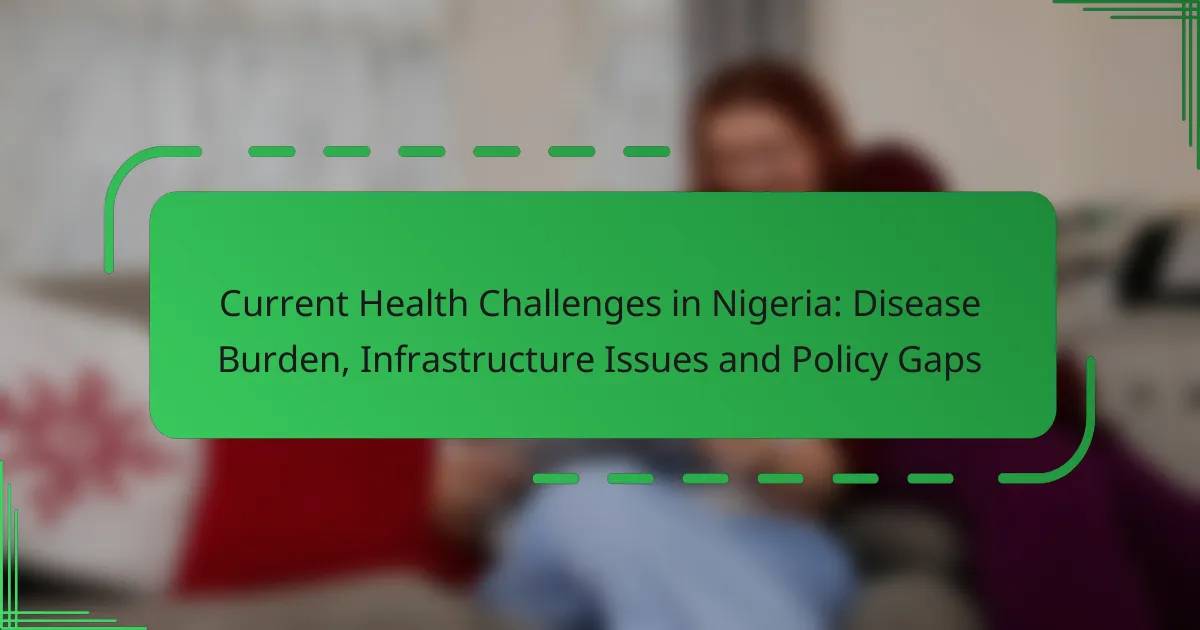Nigeria is grappling with severe health challenges characterized by a high disease burden, insufficient healthcare infrastructure, and notable policy gaps. These factors not only lead to elevated mortality rates but also diminish the overall quality of life for millions of Nigerians. Chronic and infectious diseases, such as malaria, HIV/AIDS, and tuberculosis, further complicate the public health landscape, underscoring the urgent need for effective healthcare solutions.

What are the current health challenges in Nigeria?
Nigeria faces significant health challenges, primarily driven by a high disease burden, inadequate healthcare infrastructure, and policy gaps. These issues contribute to poor health outcomes and hinder the country’s ability to provide effective healthcare services.
Disease burden from infectious diseases
Infectious diseases remain a major health challenge in Nigeria, with diseases such as malaria, tuberculosis, and HIV/AIDS significantly impacting the population. Malaria alone accounts for a substantial number of deaths, particularly among children under five years old.
Efforts to combat these diseases are often hampered by limited access to healthcare services and a lack of public awareness. Vaccination programs and preventive measures are crucial to reducing the incidence of infectious diseases.
Non-communicable diseases prevalence
Non-communicable diseases (NCDs) like diabetes, hypertension, and cancer are increasingly prevalent in Nigeria. Lifestyle changes, urbanization, and dietary shifts contribute to the rising rates of these conditions.
Addressing NCDs requires a multifaceted approach, including public health campaigns to promote healthy lifestyles and regular screenings. Early detection and management can significantly improve outcomes for individuals affected by these diseases.
Infrastructure inadequacies
Nigeria’s healthcare infrastructure is often inadequate, with many facilities lacking essential equipment and resources. This situation leads to overcrowded hospitals and long wait times for patients seeking care.
Investment in healthcare infrastructure is critical for improving service delivery. Upgrading facilities, ensuring a reliable supply of medicines, and training healthcare professionals are essential steps to enhance the overall healthcare system.
Policy gaps in healthcare
Policy gaps in Nigeria’s healthcare system hinder effective health interventions and resource allocation. Inconsistent healthcare policies and lack of enforcement contribute to disparities in access to care.
Strengthening health policies and ensuring their implementation can lead to better health outcomes. Engaging stakeholders and fostering collaboration between government and private sectors can help bridge these gaps and improve healthcare delivery.

How does the disease burden affect Nigeria’s population?
The disease burden in Nigeria significantly impacts the population’s health, leading to high mortality rates and reduced quality of life. Chronic and infectious diseases, coupled with inadequate healthcare infrastructure, exacerbate these challenges, affecting millions of Nigerians daily.
High mortality rates
Nigeria faces alarming mortality rates due to diseases such as malaria, HIV/AIDS, and tuberculosis. These conditions contribute to a high number of preventable deaths, particularly among vulnerable groups like children and pregnant women. Efforts to improve healthcare access and disease prevention are crucial to reducing these fatalities.
In rural areas, where healthcare facilities are limited, the mortality rates can be significantly higher, underscoring the need for targeted interventions and community health programs.
Impact on economic productivity
The disease burden directly affects Nigeria’s economic productivity by reducing the workforce’s health and efficiency. Illness leads to absenteeism, decreased work performance, and increased healthcare costs for both individuals and businesses. This economic strain can hinder national development and growth.
For instance, a significant portion of the population may spend a considerable amount of their income on healthcare, diverting funds from essential needs like education and housing. Improving health outcomes can thus enhance overall economic stability.
Strain on healthcare resources
The high disease burden places immense strain on Nigeria’s healthcare resources, which are already limited. Hospitals often face overcrowding, shortages of medical supplies, and insufficient personnel to meet the growing demand for services. This situation compromises the quality of care provided to patients.
To alleviate this strain, it is essential to invest in healthcare infrastructure, train more healthcare professionals, and implement effective disease prevention strategies. Strengthening the healthcare system will ultimately lead to better health outcomes and improved quality of life for Nigerians.

What are the key infectious diseases in Nigeria?
The key infectious diseases in Nigeria include malaria, HIV/AIDS, and tuberculosis. These diseases significantly impact public health and contribute to the country’s overall disease burden.
Malaria prevalence
Malaria remains a major health challenge in Nigeria, with millions of cases reported annually. The disease is transmitted through the bites of infected female Anopheles mosquitoes, leading to symptoms such as fever, chills, and fatigue.
Efforts to combat malaria include the distribution of insecticide-treated bed nets and the use of antimalarial medications. However, resistance to treatment and insecticides poses ongoing challenges to malaria control programs.
HIV/AIDS statistics
Nigeria has one of the highest rates of HIV/AIDS in the world, with millions of people living with the virus. The prevalence rate among adults is estimated to be in the low single digits, but this still represents a significant population affected by the disease.
Access to antiretroviral therapy has improved, yet stigma and discrimination continue to hinder testing and treatment efforts. Public health campaigns aim to raise awareness and reduce transmission rates, particularly among high-risk groups.
Tuberculosis incidence
Tuberculosis (TB) is another critical health issue in Nigeria, with a high incidence rate compared to global averages. The disease is caused by the bacterium Mycobacterium tuberculosis and primarily affects the lungs, leading to severe respiratory symptoms.
Efforts to control TB include the Directly Observed Treatment, Short-course (DOTS) strategy, which ensures patients complete their treatment. However, challenges such as drug-resistant TB strains complicate treatment efforts and require ongoing public health interventions.

What are the major non-communicable diseases in Nigeria?
The major non-communicable diseases (NCDs) in Nigeria include diabetes, cardiovascular diseases, and various forms of cancer. These conditions pose significant health challenges and contribute to the overall disease burden in the country, necessitating urgent attention and effective policy responses.
Diabetes rates
Diabetes is a growing concern in Nigeria, with estimates suggesting that millions of adults are living with the condition. The prevalence of diabetes is influenced by factors such as urbanization, dietary changes, and sedentary lifestyles.
Awareness and early diagnosis are crucial for managing diabetes effectively. Regular screening and education about lifestyle modifications can help mitigate the risks associated with this disease.
Cardiovascular disease statistics
Cardiovascular diseases (CVDs) are among the leading causes of death in Nigeria, accounting for a significant portion of the NCD burden. Risk factors include hypertension, obesity, and high cholesterol levels, which are increasingly prevalent due to lifestyle changes.
Preventive measures such as regular health check-ups, maintaining a balanced diet, and engaging in physical activity are essential to reduce the incidence of CVDs. Public health campaigns can play a vital role in raising awareness about these risks.
Cancer prevalence
Cancer is becoming a major health issue in Nigeria, with increasing rates of various types, including breast, cervical, and prostate cancer. Limited access to screening and treatment facilities exacerbates the situation, leading to late diagnoses and poor outcomes.
Efforts to improve cancer care include enhancing public awareness, increasing access to screening programs, and investing in healthcare infrastructure. Early detection through regular screenings can significantly improve survival rates.

How is healthcare infrastructure impacting health outcomes?
Healthcare infrastructure significantly affects health outcomes in Nigeria by determining access to services, the quality of care, and the availability of essential medicines. Poor infrastructure can lead to inadequate health services, resulting in higher disease burden and lower overall health indicators.
Access to medical facilities
Access to medical facilities in Nigeria is often limited, especially in rural areas where healthcare centers may be few and far between. Many citizens face long travel distances, which can deter them from seeking timely medical attention.
To improve access, the government and private sector need to invest in building more healthcare facilities in underserved regions. Mobile clinics and telemedicine can also help bridge the gap for those who cannot easily reach traditional healthcare settings.
Quality of healthcare services
The quality of healthcare services in Nigeria varies widely, with many facilities lacking essential equipment and trained personnel. This inconsistency can lead to misdiagnoses and ineffective treatments, further exacerbating health issues.
Enhancing the quality of healthcare requires ongoing training for healthcare workers and regular maintenance of medical equipment. Implementing standardized protocols can also help ensure that patients receive consistent and effective care across different facilities.
Availability of essential medicines
The availability of essential medicines is a critical issue in Nigeria, where many healthcare facilities struggle to maintain adequate stock levels. Patients often face delays or are unable to receive necessary medications, which can worsen health conditions.
To address this challenge, the government should prioritize the establishment of reliable supply chains and inventory management systems. Encouraging local pharmaceutical production can also reduce dependency on imports and improve access to essential drugs.

What policy gaps exist in Nigeria’s healthcare system?
Nigeria’s healthcare system faces significant policy gaps that hinder effective service delivery and access to care. Key issues include inadequate funding, lack of comprehensive health policies, and insufficient regulatory frameworks to support healthcare infrastructure.
Inadequate Funding
Inadequate funding is a major challenge in Nigeria’s healthcare system, with government expenditure often falling short of the recommended levels. The World Health Organization suggests that countries allocate at least 15% of their annual budget to health, but Nigeria’s allocation typically hovers around 5%. This shortfall limits access to essential services and necessary medical supplies.
Furthermore, reliance on donor funding can create instability, as external support may fluctuate. This inconsistency affects long-term planning and the sustainability of health programs.
Lack of Comprehensive Health Policies
The absence of comprehensive health policies contributes to fragmented healthcare delivery in Nigeria. While there are various initiatives aimed at specific health issues, such as maternal health or disease outbreaks, a cohesive national strategy is often missing. This lack of integration can lead to duplication of efforts and inefficient use of resources.
To address this, Nigeria needs to develop and implement a unified health policy that encompasses all aspects of healthcare, including prevention, treatment, and health education. Such a policy should be adaptable to local needs while aligning with international health standards.
Insufficient Regulatory Frameworks
Insufficient regulatory frameworks create challenges in maintaining quality standards across healthcare facilities in Nigeria. Many private and public health institutions operate without adequate oversight, leading to variations in service quality and patient safety. This can result in poor health outcomes and increased public distrust in the healthcare system.
Strengthening regulatory bodies and enforcing compliance with established health standards is essential. This includes regular inspections, accreditation processes, and ongoing training for healthcare providers to ensure that they meet the necessary qualifications and standards.



